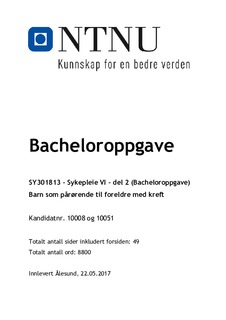| dc.contributor.advisor | Olsen, Lars Andre | |
| dc.contributor.author | Rødal, Marthe Austnes | |
| dc.contributor.author | Hansen, Martine Tårnes | |
| dc.date.accessioned | 2017-10-25T13:00:23Z | |
| dc.date.available | 2017-10-25T13:00:23Z | |
| dc.date.issued | 2017 | |
| dc.identifier.uri | http://hdl.handle.net/11250/2462134 | |
| dc.description.abstract | Hensikt: Oppgavens hensikt er å finne ut hvilke behov for informasjon og støtte barn i alderen 6-12 år har, når en forelder har en alvorlig somatisk sykdom.
Metode: Det ble gjennomført et systematisk litteratursøk etter relevant forskningslitteratur. Totalt er det inkludert fem kvalitative artikler og tre artikler med kombinert kvalitativ og kvantitativ metode.
Resultat: Barna i studiene opplevde å misforstå situasjonen om de ikke fikk tilpasset og konkret informasjon og åpen kommunikasjon. Støtte fra andre, som å snakke med helsepersonell, organiserte støttegrupper, sorggrupper, familiekurs o.l. satte også barna pris. De syntes det var godt å kunne snakke med noen som var i samme situasjon. Barns mestringsstrategier gikk ut på å snakke om, eller ikke snakke om det, distraksjon og koble av fra det sykelige, hjelpe til med praktiske oppgaver for å avlaste forelderen og positiv innstilling om at det kommer til å gå bra.
Konklusjon: Viktige faktorer som går igjen for at barn skal føle seg støttet er at barn får konkret, ærlig og tilpasset informasjon, og åpen kommunikasjon med foreldre og andre barna har tillit til. Det viste seg også at dette minsket misforståelser rundt kreftsykdommen. Det er avgjørende at sykepleier har kunnskap om barnets utvikling. | nb_NO |
| dc.description.abstract | Objective: The purpose of the assignment was to determine which needs for information and support children, aged 6-12 years, when a parent has a serious somatic disease.
Method: A systematic literature search was carried out according to relevant research literature. In total, there are five qualitative articles and three articles that have combined qualitative and quantitative methods.
Results: The children in the studies misunderstood the situation if they did not get customized and specific information and communication. Support from others, like talking to health professionals, organized support groups, bereavement support groups and family courses are things the children appreciated. They thought it was good to be able to talk to someone in the same situation. Childrens coping strategies was to talk about things or keep it to themselves. Distraction and taking their mind of things, helping out with practical tasks to relieve the parent and having a positive mindset.
Conclusion: Important factors for children to feel supported is specific, honest and personalised informasjon, and open communication with parents and others the children trust. It is shown that this reduced misunderstandings around the cancer disease. It’s crucial that nurses have knowledge of children's development. | nb_NO |
| dc.language.iso | nob | nb_NO |
| dc.rights | Attribution-NonCommercial-NoDerivatives 4.0 Internasjonal | * |
| dc.rights.uri | http://creativecommons.org/licenses/by-nc-nd/4.0/deed.no | * |
| dc.subject | Pårørende: barn | nb_NO |
| dc.subject | Foreldre med kreft | nb_NO |
| dc.subject | Mestring | nb_NO |
| dc.title | Barn som pårørende til foreldre med kreft | nb_NO |
| dc.type | Bachelor thesis | nb_NO |
| dc.subject.nsi | VDP::Medical disciplines: 700::Health sciences: 800::Nursing science: 808 | nb_NO |
| dc.source.pagenumber | 49 | nb_NO |

